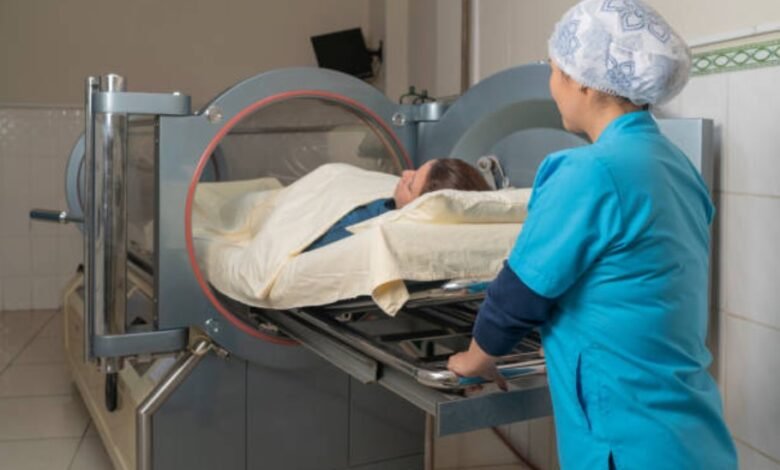Exploring Hyperbaric Oxygen Therapy in Atlanta: Benefits and Considerations

Hyperbaric Oxygen Therapy (HBOT) has gained popularity in Atlanta as a complementary treatment for various medical conditions. This article explores the benefits, considerations, and practical aspects of HBOT in the Atlanta area.
From understanding the science behind HBOT to exploring its applications and potential risks, we delve deep into why this therapy is becoming increasingly relevant in the medical community.
Understanding Hyperbaric Oxygen Therapy
Hyperbaric Oxygen Therapy involves breathing pure oxygen in a pressurized chamber. This increased pressure allows your lungs to gather more oxygen than would be possible by breathing pure oxygen at normal air pressure.
The therapy increases the amount of oxygen your blood can carry, which promotes healing and fights bacteria.
How Hyperbaric Oxygen Therapy Works
HBOT works by increasing the atmospheric pressure around your body, typically up to three times higher than normal air pressure. This high-pressure environment allows your lungs to absorb more oxygen than they would normally, which then circulates throughout your bloodstream.
This increase in oxygen can help repair damaged tissues, reduce inflammation, and improve cellular function.
Conditions Treated with Hyperbaric Oxygen Therapy
HBOT is used to treat a variety of conditions, including:
- Wound Healing: HBOT accelerates the healing of wounds by promoting the growth of new blood vessels and enhancing the delivery of oxygen and nutrients to damaged tissues.
- Carbon Monoxide Poisoning: It helps remove carbon monoxide from the bloodstream, reducing the risk of long-term neurological damage.
- Radiation Injury: HBOT can alleviate tissue damage caused by radiation therapy, especially in cancer treatments.
- Infections: It aids in fighting certain infections, particularly those caused by bacteria that thrive in low-oxygen environments.
- Chronic Diseases: Some chronic conditions like fibromyalgia and autoimmune disorders may benefit from HBOT due to its anti-inflammatory effects.
Benefits of Hyperbaric Oxygen Therapy
Atlanta’s Hyperbaric Oxygen Therapy (HBOT) offers a range of benefits across various medical conditions by enhancing oxygen delivery to tissues under increased atmospheric pressure. Here’s an in-depth look at the key advantages of HBOT:
1. Enhanced Healing Process
One of the primary benefits of HBOT is its ability to enhance the body’s natural healing process. By increasing oxygen delivery to tissues, HBOT promotes faster healing of wounds, injuries, and surgical sites.
2. Reduced Inflammation
Inflammation is a natural response to injury or infection, but excessive inflammation can delay healing and cause complications. HBOT has anti-inflammatory effects that can help reduce swelling and promote tissue repair.
3. Improved Blood Flow
HBOT improves blood flow to compromised areas of the body, which is crucial for tissue healing and the delivery of oxygen and nutrients. This is particularly beneficial for patients with vascular conditions or diabetic wounds.
4. Neurological Benefits
There is evidence suggesting that HBOT may have neuroprotective effects, protecting brain tissue from damage and promoting recovery after neurological injuries or conditions like stroke.
5. Non-Invasive Treatment Option
Unlike many medical interventions, HBOT is non-invasive and generally well-tolerated. Patients simply breathe oxygen in a pressurized chamber, making it a low-risk option for many individuals.
Considerations Before Undergoing Hyperbaric Oxygen Therapy
While HBOT offers promising benefits, there are several considerations to keep in mind:
1. Potential Side Effects
Although rare, some individuals may experience side effects such as ear discomfort, sinus pain, or temporary vision changes due to the high pressure environment. These effects are usually mild and temporary.
2. Cost and Accessibility
HBOT sessions can be costly, and insurance coverage varies. It’s essential to consider the financial implications and availability of HBOT facilities in your area.
3. Suitability for Specific Conditions
Not all medical conditions may benefit from HBOT, and it’s crucial to consult with a healthcare provider to determine if HBOT is appropriate for your specific condition and medical history.
4. Treatment Duration and Frequency
The number of HBOT sessions needed varies depending on the condition being treated. Some conditions may require daily sessions for weeks or even months, which can impact scheduling and daily routines.
Hyperbaric Oxygen Therapy in Atlanta: What You Need to Know
In Atlanta, HBOT is offered at various medical centers and specialized facilities. It’s essential to choose a reputable provider with certified technicians and medical oversight to ensure safety and effectiveness.
1. Finding a Qualified Provider
When considering HBOT in Atlanta, research facilities that have experience in administering HBOT and treating your specific condition. Look for certifications and reviews to gauge the quality of care.
2. Understanding the Treatment Process
Before starting HBOT, your healthcare provider will conduct a thorough evaluation to determine if you’re a suitable candidate. They will explain the treatment process, including session duration, expected outcomes, and any potential risks.
3. Integrating HBOT with Other Therapies
HBOT is often used in conjunction with other medical treatments and therapies. Your healthcare team will coordinate care to optimize outcomes and ensure comprehensive treatment.
4. Financial Considerations
Discuss the cost of HBOT sessions with your healthcare provider and inquire about insurance coverage or payment plans. Some facilities may offer financial assistance or discounts for multiple sessions.
Conclusion
Hyperbaric Oxygen Therapy is a promising treatment option for various medical conditions, offering enhanced healing, reduced inflammation, and improved overall well-being. In Atlanta, individuals have access to specialized facilities and experienced healthcare providers who can guide them through the HBOT process.
By understanding the benefits, considerations, and practical aspects of HBOT, patients can make informed decisions about incorporating this therapy into their treatment plans.




